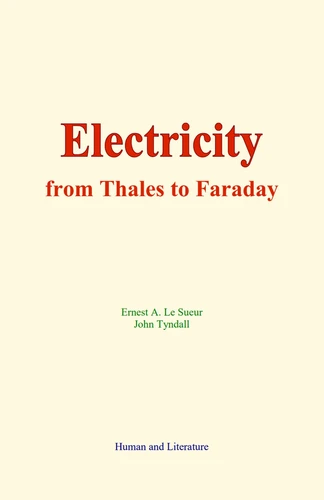Electricity : from Thales to Faraday
Par : ,Formats :
Disponible dans votre compte client Decitre ou Furet du Nord dès validation de votre commande. Le format Multi-format est :
- Pour les liseuses autres que Vivlio, vous devez utiliser le logiciel Adobe Digital Edition. Non compatible avec la lecture sur les liseuses Kindle, Remarkable et Sony
 , qui est-ce ?
, qui est-ce ?Notre partenaire de plateforme de lecture numérique où vous retrouverez l'ensemble de vos ebooks gratuitement
Pour en savoir plus sur nos ebooks, consultez notre aide en ligne ici
- FormatMulti-format
- ISBN978-2-38111-952-6
- EAN9782381119526
- Date de parution13/02/2024
- Protection num.NC
- Infos supplémentairesMulti-format incluant ePub avec ...
- ÉditeurHuman and Literature Publishing
Résumé
It is so common a notion nowadays that electricity had its birth and rise in the nineteenth century that it gives one a strange mental sensation to contemplate the fact that all the myriads of commercial applications that have of late years been developed in this field might have been made by the Chinese or the ancient Egyptians, so far as the potentiality of Nature for developing electrical phenomena is concerned.
The writer used to know a delightful old gentleman in Vermont who once referred, as to a well-known fact, to Edison's having invented electricity. It is astonishing how closely his state of mind typifies that of a great many people. In the form of the lightning, the aurora, and the shock of the electric eel or torpedo, electrical manifestations have been known ever since man commenced to observe those phenomena, but the fossil resin amber was the substance which eventually gave its name to the now tremendous agency.
This material was observed, many centuries before our era, to possess the property of attracting light bodies to itself when rubbed with wool, and, being called electron by the Greeks, transmitted its name to the property or force which it thus brought into evidence. The fact is mentioned as early as 600 B. C, by Thales of Miletus, although he does not transmit to us the name of the original observer of the phenomenon.
Homely as was the experiment, it marked a beginning in electrical research.
The writer used to know a delightful old gentleman in Vermont who once referred, as to a well-known fact, to Edison's having invented electricity. It is astonishing how closely his state of mind typifies that of a great many people. In the form of the lightning, the aurora, and the shock of the electric eel or torpedo, electrical manifestations have been known ever since man commenced to observe those phenomena, but the fossil resin amber was the substance which eventually gave its name to the now tremendous agency.
This material was observed, many centuries before our era, to possess the property of attracting light bodies to itself when rubbed with wool, and, being called electron by the Greeks, transmitted its name to the property or force which it thus brought into evidence. The fact is mentioned as early as 600 B. C, by Thales of Miletus, although he does not transmit to us the name of the original observer of the phenomenon.
Homely as was the experiment, it marked a beginning in electrical research.
It is so common a notion nowadays that electricity had its birth and rise in the nineteenth century that it gives one a strange mental sensation to contemplate the fact that all the myriads of commercial applications that have of late years been developed in this field might have been made by the Chinese or the ancient Egyptians, so far as the potentiality of Nature for developing electrical phenomena is concerned.
The writer used to know a delightful old gentleman in Vermont who once referred, as to a well-known fact, to Edison's having invented electricity. It is astonishing how closely his state of mind typifies that of a great many people. In the form of the lightning, the aurora, and the shock of the electric eel or torpedo, electrical manifestations have been known ever since man commenced to observe those phenomena, but the fossil resin amber was the substance which eventually gave its name to the now tremendous agency.
This material was observed, many centuries before our era, to possess the property of attracting light bodies to itself when rubbed with wool, and, being called electron by the Greeks, transmitted its name to the property or force which it thus brought into evidence. The fact is mentioned as early as 600 B. C, by Thales of Miletus, although he does not transmit to us the name of the original observer of the phenomenon.
Homely as was the experiment, it marked a beginning in electrical research.
The writer used to know a delightful old gentleman in Vermont who once referred, as to a well-known fact, to Edison's having invented electricity. It is astonishing how closely his state of mind typifies that of a great many people. In the form of the lightning, the aurora, and the shock of the electric eel or torpedo, electrical manifestations have been known ever since man commenced to observe those phenomena, but the fossil resin amber was the substance which eventually gave its name to the now tremendous agency.
This material was observed, many centuries before our era, to possess the property of attracting light bodies to itself when rubbed with wool, and, being called electron by the Greeks, transmitted its name to the property or force which it thus brought into evidence. The fact is mentioned as early as 600 B. C, by Thales of Miletus, although he does not transmit to us the name of the original observer of the phenomenon.
Homely as was the experiment, it marked a beginning in electrical research.



